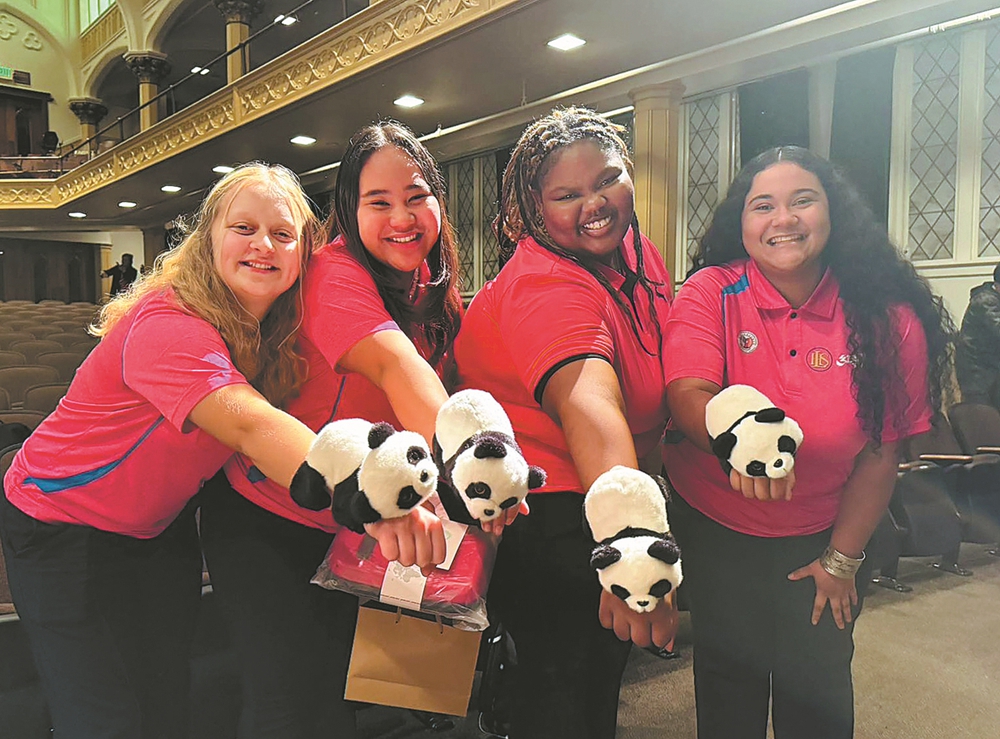Key role seen for education exchanges

Lincoln High School students pose with gift pandas from Sichuan province at an event celebrating the friendship between Washington State and Sichuan in Tacoma on Nov 20, 2023. (Linda Deng/China Daily)
People-to-people exchanges, especially educational ones, play a key role in the bigger picture of United States-China relations, and sometimes the events with the most impact "occur quietly", said an expert on Sino-US educational cooperation.
"I'm hopeful that as we continue the dialogue in 2024, we will see even more progress that will help to sustain and support the continuation of educational exchanges and cooperation between the two countries," said Denis Simon, a distinguished fellow at the Washington-based Institute for China-America Studies, in an interview with China Daily.
Simon most recently served as a clinical professor of global business and technology at the University of North Carolina at Chapel Hill's Kenan-Flagler Business School. He also was vice-president and executive vice-chancellor of Duke Kunshan University, a joint venture of Duke University in the US, Wuhan University in Hubei province and the city of Kunshan, Jiangsu province, from 2015 to 2020.
Simon emphasized the role of exchanges in overall US-China relations. "If we can maintain the progress and maintain the discussion, I'm hopeful that the education relationship can insulate itself to some degree from these larger problems," he said.
"Sometimes these kinds of people-to-people diplomacy occur quietly. They're not accompanied by a lot of fanfare and noise, but they accomplish a great deal," he said.
Simon said the first post-COVID US-China Higher Education Dialogue, held in New York in September, was "extremely successful".The event, co-hosted by the Institute of International Education and the China Education Association for International Exchange, involved about 15 Chinese universities and a similar number of US universities.
"The discussions covered every aspect of the bilateral education relationship", including undergraduate education, graduate education, university research collaboration and also policy issues like visa issues that are affecting the bilateral education exchange, Simon said.
"I think that we can keep talking and have dialogues like this and have them conducted in such an open and frank way. That gives me great hope," he said, adding that relations involving education are still in a "transitional phase".
"We've gone from a height of having 370,000 Chinese students in the US before COVID, and now we're down to about 289,000," Simon said.
"We're starting to see some recovery, of course, in this post-COVID era. But it's yet unclear whether or not we're going to go back to the good old days of… big numbers wanting to come to the United States."
On the other hand, the number of US students in China "is really limited", he said, noting that the number peaked at about 15,000 around 2011, while by 2022 it was around 400. "The ability of our two countries to understand one another really does depend on the young people who are crossing the Pacific, learning about each other's cultures and countries, learning to speak the languages," he said.
"And if they don't achieve that, then the United States, in particular, is going to suffer because we will not have a generation of professionals, whether they're in business, government or academia, who have a deep understanding of the situation in China, and that does not bode well for the long term," he added.
'Wonderful gesture'
During the November summit between President Xi Jinping and US President Joe Biden in San Francisco, Xi said that China was ready to invite 50,000 young people from the US to participate in exchange and study programs in China over the next five years.
Simon said it was "a wonderful gesture" by China's president.
"Because I think he, too, realizes, as do many, many of my Chinese friends, that Americans need to have access to China and need to have an experience living and working with Chinese counterparts," said Simon.
"And now there's a whole new generation of students who want to study China in terms of its global role," Simon said. "That means they want to understand more about China's environment policy, China's health policy, China's policies about food security, and all sorts of things that influence the way China interfaces with the rest of the world."